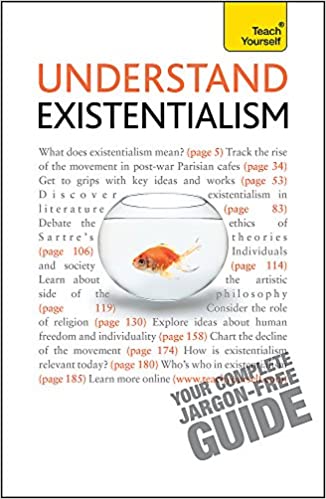Understand Existentialism
 What is human life about? What does it mean to be an authentic human individual? Am I trapped by the circumstances of my birth, or can I genuinely transcend them? How do I understand and cope with the hopes, fears and anxieties that shape my personal life?
What is human life about? What does it mean to be an authentic human individual? Am I trapped by the circumstances of my birth, or can I genuinely transcend them? How do I understand and cope with the hopes, fears and anxieties that shape my personal life?
These are existential questions. They do not require some overall explanation about the nature of reality, nor are they answerable in terms of scientific evidence. Rather, they all start with the fact that human individuals have to live in relation to the world around them. People have projects that they seek to fulfil, and their choices are based on hopes for the future. Yet life is limited and we face the inevitability of death. What, if anything, is worthwhile?
These questions have long been explored through art, literature and religion, but they are also central to one particular tradition in philosophy: existentialism. It considers the meaning of human life: its goals, significance and the experience of responsibility – shaping the future and living in an authentic way. In other words, it is about what it means to be a human being living in the world. The general view of existentialist philosophers is that life is not presented to us already packaged with meaning and purpose, but it is what we make of it.
Existentialism in post-war Paris, centred on the work of Jean-Paul Sartre, became probably the most fashionable philosophy known. With it came a belief in freedom and self-determination and the rejection of convention. But the philosophical questions upon which is it based had first been raised in the 19th century by Kierkegaard and Nietzsche. Such questions built on the work of Husserl and Heidegger earlier in the 20th century. Existentialism became hugely popular in Europe in the years following the Second World War, when people were all too aware of the fragility of life and wanted a philosophy that was positive, self-affirming but not escapist.
Existentialism is above all a philosophy for the streets rather than the academic cloister. In addressing the fundamental questions about how we understand, direct and give meaning to our lives, it remains relevant at the end of the first decade of the 21st century, when economic, political, social and environmental issues continue to confront people with an uncertain future.
 A key feature of this book is that is explores both existentialist philosophy and also its impact on the worlds of literature and art.
A key feature of this book is that is explores both existentialist philosophy and also its impact on the worlds of literature and art.
And for those who might be tempted to see existentialism only in its historical context - expressing the longing for freedom and authenticity following the Second World War - this book also explores the permanent (and, to me, absolutely central) value of asking existential questions.
What can be more important than asking about how we find meaning and purpose in life?
'Look inside...'
If you click on this Amazon link, you can 'Look inside' the book, giving you the detailed breakdown of the contents and some sample pages. You can also buy copies in paperback or e-book formats.

